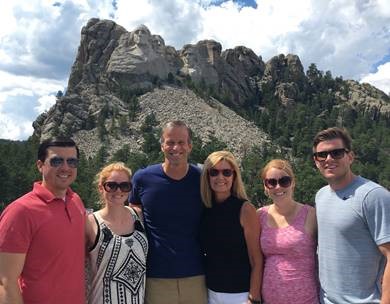WASHINGTON — U.S. Sen. John Thune (R-S.D.) today introduced a bill to temporarily increase the availability of H-2B visas for the purpose of restoring American forests. The bill would establish an uncapped, but temporary, carve-out of the H-2B program to permit a surge in workers to address a multi-year backlog in forest management, including wildfire restoration, long-term timber supply, and carbon sinks.
“Healthy and resilient forests provide a host of environmental and economic benefits, but we’re losing valuable time to recover from wildfires and other disturbances,” said Thune. “Roughly 10,000 H-2B workers plant 85 percent of the trees planted annually in the United States, and they support over 1 million domestic jobs. We shouldn’t cap this workforce that underpins our forest health and forestry industry.
“The benefits of this bill extend far beyond wildfire and habitat restoration. New trees play a critical role in capturing carbon at a faster rate than older trees, and the responsible and sustainable development of that timber can reduce consumer costs and keep that carbon from being released in wildfires. My bill would also provide additional relief for the annual H-2B cap, which is a vital source of supplemental workers in South Dakota and a well-established, legal pathway for economic migration.”
“The Forest Resources Association applauds Senator Thune’s leadership and efforts in introducing his bill to make additional H-2B visas available for forestry employers,” said Deb Hawkinson, president of the Forest Resources Association. “Additional visas would help forest landowners increase the number of acres planted each year, ensuring healthy forests, improved carbon sequestration, and securing full-time jobs for future generations of Americans. Seasonal workers on H-2B visas have long supplemented the U.S. workforce replanting our forests. Millions of acres of forest and thousands of U.S. workers throughout the forest products supply chain depend on the critical seasonal tree planting performed by H-2B workers each year. Over the past decade, there has been a continual shortage of U.S. workers willing to fill these strenuous seasonal tree planting jobs, and the disruptions caused by the pandemic have made these labor shortages worse. The decreasing availability of H-2B visas is putting the health of our forests at risk.”
The new “H-2C” (conservation) program created by Thune’s bill would be nested within the H-2B program, but exempted from the annual cap of 66,000 visas, for a period of five years. This would simultaneously relieve demand from the oversubscribed H-2B program, which provides a vital, seasonal workforce during South Dakota’s peak tourism months and for construction and landscaping. H-2C activities would be limited to orchard work and seed collection, tree planting, nursery care, forest and vegetation management, wildfire mitigation and brush clearing, timber stand improvement, and other activities with a direct forest health or conservation nexus, such as fish and wildlife habitat or watershed protection.


